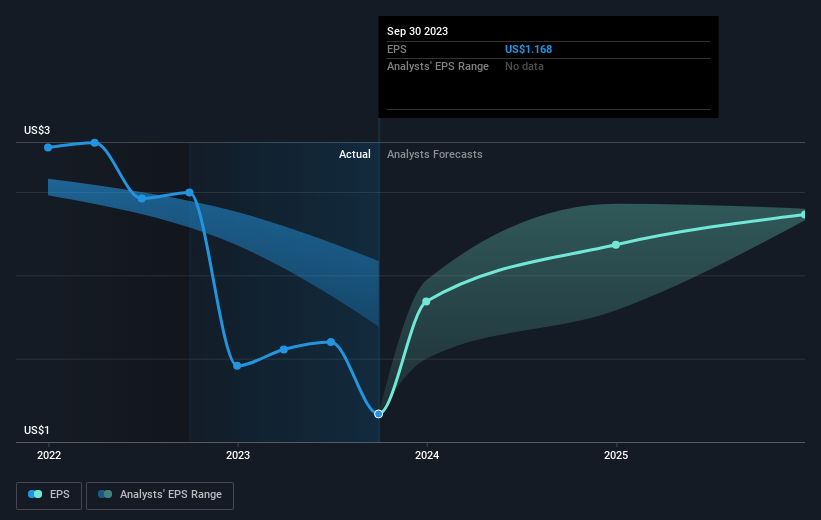- United States
- /
- Mortgage REITs
- /
- NYSE:BXMT
Blackstone Mortgage Trust (NYSE:BXMT) investors are up 5.4% in the past week, but earnings have declined over the last five years

For many, the main point of investing is to generate higher returns than the overall market. But even the best stock picker will only win with some selections. At this point some shareholders may be questioning their investment in Blackstone Mortgage Trust, Inc. (NYSE:BXMT), since the last five years saw the share price fall 35%.
While the last five years has been tough for Blackstone Mortgage Trust shareholders, this past week has shown signs of promise. So let's look at the longer term fundamentals and see if they've been the driver of the negative returns.
See our latest analysis for Blackstone Mortgage Trust
To quote Buffett, 'Ships will sail around the world but the Flat Earth Society will flourish. There will continue to be wide discrepancies between price and value in the marketplace...' One flawed but reasonable way to assess how sentiment around a company has changed is to compare the earnings per share (EPS) with the share price.
Looking back five years, both Blackstone Mortgage Trust's share price and EPS declined; the latter at a rate of 14% per year. The share price decline of 8% per year isn't as bad as the EPS decline. So investors might expect EPS to bounce back -- or they may have previously foreseen the EPS decline.
The graphic below depicts how EPS has changed over time (unveil the exact values by clicking on the image).

We consider it positive that insiders have made significant purchases in the last year. Even so, future earnings will be far more important to whether current shareholders make money. This free interactive report on Blackstone Mortgage Trust's earnings, revenue and cash flow is a great place to start, if you want to investigate the stock further.
What About Dividends?
When looking at investment returns, it is important to consider the difference between total shareholder return (TSR) and share price return. The TSR is a return calculation that accounts for the value of cash dividends (assuming that any dividend received was reinvested) and the calculated value of any discounted capital raisings and spin-offs. So for companies that pay a generous dividend, the TSR is often a lot higher than the share price return. As it happens, Blackstone Mortgage Trust's TSR for the last 5 years was 2.8%, which exceeds the share price return mentioned earlier. This is largely a result of its dividend payments!
A Different Perspective
Blackstone Mortgage Trust shareholders are up 1.5% for the year (even including dividends). But that return falls short of the market. The silver lining is that the gain was actually better than the average annual return of 0.6% per year over five year. This suggests the company might be improving over time. It's always interesting to track share price performance over the longer term. But to understand Blackstone Mortgage Trust better, we need to consider many other factors. Consider for instance, the ever-present spectre of investment risk. We've identified 2 warning signs with Blackstone Mortgage Trust (at least 1 which can't be ignored) , and understanding them should be part of your investment process.
Blackstone Mortgage Trust is not the only stock insiders are buying. So take a peek at this free list of growing companies with insider buying.
Please note, the market returns quoted in this article reflect the market weighted average returns of stocks that currently trade on American exchanges.
Valuation is complex, but we're here to simplify it.
Discover if Blackstone Mortgage Trust might be undervalued or overvalued with our detailed analysis, featuring fair value estimates, potential risks, dividends, insider trades, and its financial condition.
Access Free AnalysisHave feedback on this article? Concerned about the content? Get in touch with us directly. Alternatively, email editorial-team (at) simplywallst.com.
This article by Simply Wall St is general in nature. We provide commentary based on historical data and analyst forecasts only using an unbiased methodology and our articles are not intended to be financial advice. It does not constitute a recommendation to buy or sell any stock, and does not take account of your objectives, or your financial situation. We aim to bring you long-term focused analysis driven by fundamental data. Note that our analysis may not factor in the latest price-sensitive company announcements or qualitative material. Simply Wall St has no position in any stocks mentioned.
About NYSE:BXMT
Blackstone Mortgage Trust
A real estate finance company, originates senior loans collateralized by commercial properties in North America, Europe, and Australia.
High growth potential average dividend payer.
Similar Companies
Market Insights
Community Narratives




